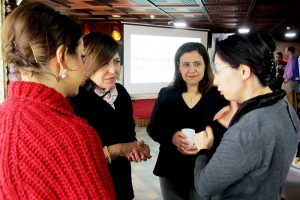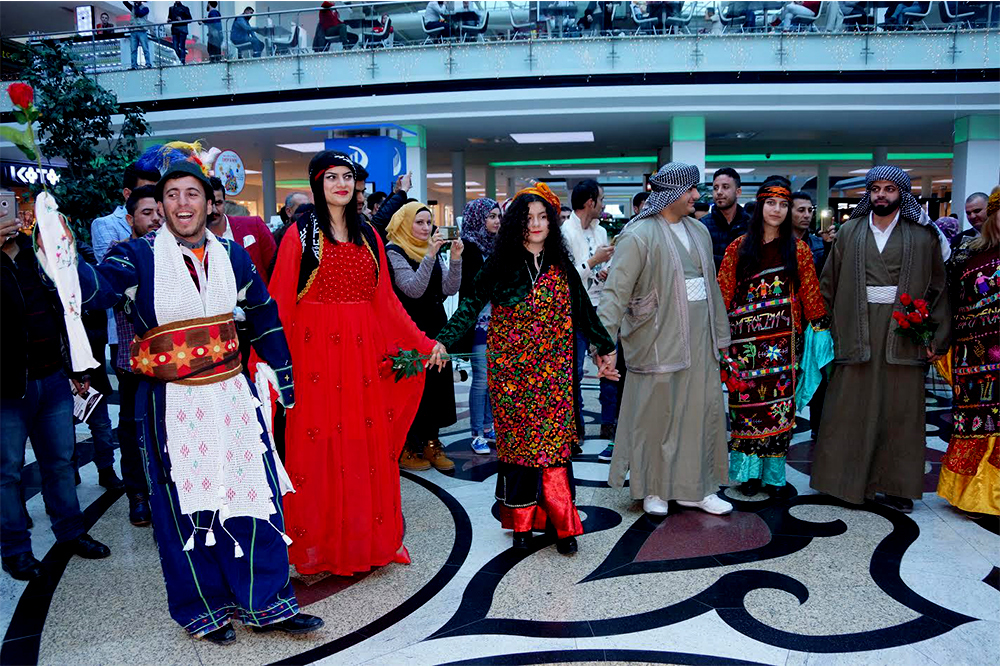In an Iraqi mall on Valentine’s Day, shoppers were treated to a unique sight. Twenty-eight young people wearing traditional dress from the many cultures in the country congregated to sing, dance, and hand out flowers and balloons with messages of love and co-existence.
The event, one of 42 created and implemented by Iraqi youth across Iraq, was to promote peaceful coexistence and tolerance among Iraqi communities struggling through a divisive political climate.
The project brings together Eastern Mennonite University’s Center for Justice and Peacebuilding and the Iraqi al-Amal Association to focus on youth and academics building a culture of peace in the country.
As key stakeholders in Iraqi social fabric, youth and academics are “seen as instrumental in strengthening social cohesion and promoting civil society initiatives and dialogue between various ethnic and religious groups,” according to the project grant, which is funded by the United Nations Development Programme (UNDP).
Five EMU faculty and alumni are involved: Dr. Alma Abdul-hadi Jadallah, president and managing director of Kommon Denominator, and CJP adjunct faculty; Aala Ali MA ’14, UNDP development officer; Cynthia Nassif MA ’14 of Lebanon , and Najla El Mangoush MA ’15 of Libya, both doctoral students at George Mason University; and Ahmed Tarik MA ’16, of Iraq.
Nassif, Mangoush and Tarik designed workshops on conflict resolution in Arabic for both youths and academics. Jadallah provided the first training for youth in October 2016, followed by two others for youth and three for academics from Iraqi universities. While the academic trainings will lead to a peace building curricula that would be shared by universities across Iraq, the youth trainings culminated in a series of community peacebuilding project proposals.
Mangoush appreciated the opportunity to work together with CJP alumni on one project, “practicing our beliefs and skills as peacebuilders from different Arabic countries to assist peace in Iraq.” An important aspect of the project, she adds, is “acknowledging the need to promote peace from a local perspective and through religious tolerance.”
More than 563 youth from Najaf, Nineveh and Baghdad applied to participate in the trainings. Seventy-two were selected, with criteria including age, potential, experience, connections, responsibility, diversity and vision.
After the trainings, participants created project proposals that employed sports, arts, social media, listening and dialogue to address a variety of topics: women’s rights, children’s education, displaced persons and host community engagement, interfaith dialogue and conflict resolution workshops, according to Nassif. El Mangoush and Nassif evaluated and selected proposals for funding.
Muntather Hassan, youth program coordinator for the Iraqi al-Amal Association, has attended each training, worked with youth on their proposals, and watched selected projects come to fruition.

Besides the Valentine’s Day project, other funded projects include:
- A Facebook page that provides a space for artworks created on the theme of peace. Five artists started this project, and they’ve been joined by 50 others.
- Visitation programs in Erbil, where Muslim activists visited internally displaced Christian children in Erbil, and in Baghdad, where both Christian and Muslim activists visited Muslim children.
Though Iraq is full of problems, Hassan says young people see a chance to make a difference and to address issues “the older generation can’t see.” They are motivated, he said, by the desire to live a normal life without fear, “ordinary needs that give them motivation.”
“A journey like this comes once a life,” wrote one participant. Another shared that he felt “loved, respected, supported and listened to.” Yet another learned not all Muslims are ISIS.”
“Mohammed came back from Erbil as a different person, a better one,” said one participant’s parents.

Using the arts in this creative vision is an enormous step toward reconciliation. The arts help to interrupt preconceptions and provide alternatives for this younger generation.
Thank you for sharing this with us in America.
We have so much to learn!
This is such a joyous, hopeful message. I am grateful that CJP has been a part of yet another ray of light in so much darkness. I am thankful for the young people who a part of making peace. It makes me wonder if you could also design something to help us heal divisions here at home. It is critically needed. There are so many people, and not just immigrants and undocumented individuals, who are afraid, fearful still, of the destructive forces among us now.
Thanks for your interest in domestic peacebuilding. The idea of replicating such a project here in the United States is intriguing and I’ve shared it with Daryl Byler, CJP’s executive director. Our Interfaith Peace Camp, hosted by the Center for Interfaith Engagement, is one such place where young people learn about other faiths. Additionally, several graduate students have produced films and art projects featuring voices of immigrants. Each year, CJP graduate students spend many hours in the local community both practicing their skills and building peaceful community infrastructures through dialogue and mediation work, work with youth in the Boys and Girls Club and with teen refugees.
This year, our Summer Peacebuilding Institute developed several classes to help domestic organizers facilitate dialogue. Read more here:
And you may also be interested in the work of Better Angels, a dialogue organization that held their board meeting at EMU this summer. We enjoyed a concert by Peter Yarrow!
How exciting! How encouraging! More power to these creative and courageous peace-builders!
Wonderful—and I agree with Anne who says we need this here in the US! Carolyn